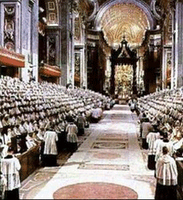Wednesday, September 27, 2006
 More on religious life ...
More on religious life ...
It is the duty of the ecclesiastical hierarchy to regulate the practice of the evangelical counsels by law, since it is the duty of the same hierarchy to care for the People of God and to lead them to most fruitful pastures.(Ezech. 34, 14.)
These "counsels" are the practices of poverty, chastity, and obedience.
The importance of the profession of the evangelical counsels is seen in the fact that it fosters the perfection of love of God and love of neighbor in an outstanding manner and that this profession is strengthened by vows.(Cfr. Conc. Vat. I. Schema De Ecclesia Christi, cap. XV, et Adnot. 48: Mansi 51, 549 s. et 619 s. Leo XIII, Epist. Au milieu des consolations, 23 dec. 1900: AAS 33 (1900-01) p. 361. Pius XII, Const. Apost. Provida Mater, 1. c., p. 1145.) Furthermore, the hierarchy, following with docility the prompting of the Holy Spirit, accepts the rules presented by outstanding men and women and authentically approves these rules after further adjustments. It also aids by its vigilant and safeguarding authority those institutes variously established for the building up of Christ's Body in order that these same institutes may grow and flourish according to the spirit of the founders.
Strange that the hierarchy is counseled in docility. But hold up: the pope can shepherd religious orders form the oversight of a local bishop to himself. At any rate, members of orders should show due respect to the hierarchy:
Any institute of perfection and its individual members may be removed from the jurisdiction of the local Ordinaries by the Supreme Pontiff and subjected to himself alone. This is done in virtue of his primacy over the entire Church in order to more fully provide for the necessities of the entire flock of the Lord and in consideration of the common good.(Cfr. Leo XIII, Const. Romanos Pontifices, 8 maii 1881: AAS 13 (1880-81) p. 483. Pius XII, Alloc. Annus sacer, 8 dec. 1950: AAS 43(1951) p. 28 8.) In like manner, these institutes may be left or committed to the charge of the proper patriarchical authority. The members of these institutes, in fulfilling their obligation to the Church due to their particular form of life, ought to show reverence and obedience to bishops according to the sacred canons. The bishops are owed this respect because of their pastoral authority in their own churches and because of the need of unity and harmony in the apostolate.(Cfr. Pius XII, Alloc. Annus sacer, 1. c., p. 28. Pius XII, Const. Apost. Sedes Sapientiae, 31 maii 19S6: AAS 48 (1956) p. 355. Paulus VI, 1. c., pp. 570-571.).
Though not a "s"acrament, the liturgical expression of religious profession is a vital part of the picture. In other words, such a commitment is made publicly, presumably not just for the members of the particular community, but for the benefit of all.
The Church not only raises the religious profession to the dignity of a canonical state by her approval, but even manifests that this profession is a state consecrated to God by the liturgical setting of that profession. The Church itself, by the authority given to it by God, accepts the vows of the newly professed. It begs aid and grace from God for them by its public prayer. It commends them to God, imparts a spiritual blessing on them and accompanies their self-offering by the Eucharistic sacrifice.
Time's running out on commentary from religious on religious life. Any takers?